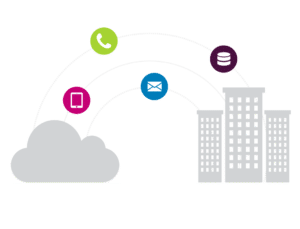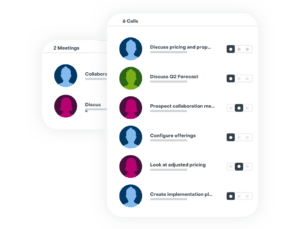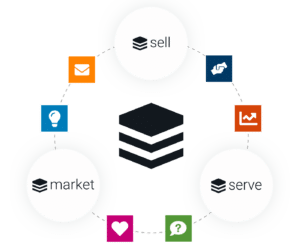Avoid Sticker Shock: Here’s What a CRM Really Costs?
By now, you know the importance of customer relationship management (CRM) and the impact it can have on your business. The trick is choosing the right provider with the best value. There are now more than 2,200 CRM providers in the U.S. How can you know which one is right for your business?
We’ve put together a guide to CRM pricing to help you know what to look for, what’s standard, and what you can afford to skip. So, how much does a CRM really cost? Find out the truth here.
What Does a CRM Cost?
Each CRM platform is different. Some serve a variety of sales needs, while others offer niche services. That means prices fluctuate depending on the provider and the type of features you require.
CRMs range in price from about $12 per user per month on the low end to $300 per user per month for large enterprises with complex needs. Mid to large enterprises can expect to pay between $50 and $150 per user per month.
Some CRM solutions offer free editions, which make sense if you’re a small business getting your feet wet. But limitations on features, users, and data storage will restrict your usage as you begin to scale.
The cost of a CRM can be broken down into four main fees:
- Subscription costs. Subscription costs are ongoing fees for cloud-based CRMs, which can be monthly, quarterly, or annually. This is opposed to on-premise CRMs, which businesses pay upfront for in-user licenses.
- Service level costs. Service level costs are determined by the plan or package you choose, the volume of records you have, and the premium features you choose to add on later.
- Cost per user. Many CRMs charge based on each individual who uses the platform. The amount is often included in the package price, but you can add more if needed.
- Implementation fees. These are the costs of CRM setup and can be quite time intensive and costly depending on the solution(s) you choose. Industry experts say you can expect to spend $1 in implementation consulting for every $1 in your annual subscription costs.
Services for CRM Implementation
CRM implementation and deployment can require a significant time investment because they address so many areas of your future software use. The stages of implementation typically include:
Planning and Discovery
This is where you define your CRM strategy, set goals, and determine a timeline for getting up and running. Your CRM’s implementation team or agency partner can help you answer the right questions to get started and help the process run smoothly. Upfront planning helps you set boundaries for your implementation to prevent scope creep, which wastes time and extra money.
Setup and Configuration
Identify which data needs to be migrated. Then, prepare your data for migration by merging duplicate records, fixing formatting issues, and standardizing data fields. You may want to test a small sample first before migrating all of your data.
You’ll need to define your CRM settings and what customizations you want (e.g., workflows, templates, integrations). This is also where you’ll integrate third-party apps like email, project management tools, social media management solutions, or support and ticketing apps unless the CRM you choose already includes these solutions in one platform.
Development and Testing
You’re almost finished with your implementation. Testing is an important step to verify the software is fully functional and meets your requirements. Test components such as:
- Migrated data: Ensure all imported records match the correct fields without duplicate data.
- Contacts: Verify that assigned data fields are recognized and fillable.
- Email capture: Check that email exchanges are associated with the correct contact and two-way email sync works.
- Lead routing: Test that leads will be routed to the correct sales rep according to your predefined rules.
- Pipeline management: Confirm deal columns in each pipeline match the sales process.
- Automated tasks: Try out task triggers to see if they work as expected.
- Integrations: Make sure all of your business apps are seamlessly connected to ensure no business interruptions.
- Reports: See if the data you input matches the expected results.
- Website forms: Double-check that forms display correctly, fields are fillable, and completed forms are properly routed where they need to go.
Once these areas are good to go, it’s time to launch!
Training
Training your team is critical for user adoption and subsequent ROI. Set aside ample time for training sessions, check your CRM provider’s resources, and check back with new users to gather their feedback. What do they still need to be successful?
SugarU offers platform training and certification for end users, administrators, developers, and solution architects.
The Hidden Costs of CRM Implementation
The total cost of a CRM can include much more than just the upfront price. CRM implementation, integrations, add-ons, user training, and regular upkeep all require investment in the form of both money and time. You may end up paying extra for things, including:
- Extra data storage
- Additional users
- 24/7 support
- Mobile app access
- Offline access
Perhaps the heftiest hidden CRM cost is money paid for an implementation that eventually fails. To avoid buyer’s remorse, do your homework, make a plan, and be sure to ask important questions up front like:
- What does the implementation process look like, and what is included?
- Are live training and resources provided?
- How many additional tools and support will I need?
- Can the platform grow with my business—or does that cost extra?
SugarCRM Pricing: No Secrets Here
Sugar is upfront about platform costs, which you can learn about on our pricing page. Sugar Sell starts at $49 per user per month and increases based on your sales needs, from Sell Essentials to Sell Advanced ($80/user/month) and Sell Premier ($135/user/month). Sugar Serve starts at $80 per user per month, and Sugar Market starts at $1,000 per month for 10,000 contacts. Need an on-premise CRM? Sugar Enterprise starts at $85 per user per month.
While Sugar is not offered free, you can get a sneak peek of the solution with three-minute demos on demand at no charge.
These tiers don’t signify a “good, better, best” model but rather a suite of options to choose from based on what your company needs.
With Sugar, you don’t have to worry about hidden costs. However, we offer optional products (like LinkedIn Sales Navigator Plug-In and Oktopost) at an additional cost. These products extend functionality or provide integration to other applications and are not required.
Still, want to know more about SugarCRM pricing? Speak with a representative today to learn how to implement and customize Sugar to your business.




